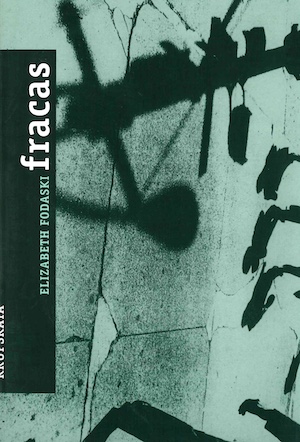Elizabeth Fodaski
fracas

ISBN 1-928650-02-3
$9.00
78 pages
"I like the blend of her poems . . . slightly scientific, slightly O'Hara. If poems can be said to be leafy, these are it. I guess what I mean about scientific is that each little poem, and even the bigger ones are anexperiment. I don't mean experimental poetry, what's that? I mean thought as an experiment, a foray, like Lewis & Clark, sort of a fringe of adventure upon the page. Throughout this (book) is a series of poems that begin: 'Dear B.' It's the bud of the epistolary impulse, to begin a letter again and again. Liz's poems are very raw. They are the impulse to speak."
--Eileen Myles
"Here is a poet who can write this: We are at once documented / and anonymous / the stories bleed / together like so many / indigenous histories, / the rifles cocked / targets random / and equivalent. / we come from the page / but appear nowhere / in the book. What does appear in this book limns 'the anatomy of associative thought,' does not bypass emotion, explores the positions of love on the page."
--Joan Retallack
"'It's not the question of a different drummer, it's that I just don't march' (14) writes Elizabeth Fodaski in her stunning first collection fracas. The long poem 'Anatomy of Associative Thought' ranges from the pure, self-identifying defiance of this line to the aesthetic 'glass / in a language of multitudes / the can't change but they / change' of a later section, wandering through other modes such as the epistolary (a series of letters to the mysterious dead-or-not-dead "B.") to the anthemic or elegiac: 'like so many Lucky Pierres, we had had such a buoyant sense of life in our midst / and then our emotions became something discrete from our culture, / the grief suddenly whelming us like a bad stench.' (9) The humor is never indulgent, tapering around the axis of the personal / political, the 'reality of knowledge,' offering us 'the cerebral advantage / not the thing itself but ideas about the thing.' (19). As if capitalism were something like a love affair with the world, requiring both decorum and the respect a partner demands, Fodaski is aware of how the emotions particularly the testosterone-motivated male brandcan do double damage, both in and out of the home ('we join the superpowers when we exploit'), and she gives voice to these demands. The sequence "ETYMOLOGIES" moves through several pomo lyric registers in its irreverent, but deep definition of defining itself, while slyly taking in some recent poetical history: 'They in the 80's / liked the visual page / [...] everyone in / the nineties / adores the @ / reminds of a register / ringing.' (55) Like many poets of her generation, Fodaski is finding a unique voice for herself in what has become, suspiciously, an era of the "authorless" as hero, while not sacrificing the utopian pinings and agonic urgencies of the postmodernist dalliance with social-meets-formal radicality."
--Brian Kim Stefans
"Elizabeth Fodaski's fracas grabs attention, then holds, examines, and explodes the attentions it attracts. This work is both elegant and playful, sardonic and amused. A din, a brawl, a noisy quarrel. It instructs, implores, and navigates a level of writerly inquiry that's a joy to encounter. From the heady, generative tumble of "Flood Watching" to the studied and gorgeous language of "Paper Daybreak" and "ETYMOLOGIES", fracas rocks."
--Jessica Grim
Elizabeth Fodaski lives in her native New York City. She is editor and publisher of Torque, and has been a curator of the Segue Foundation's reading series for the past six years. She teaches in Brooklyn.